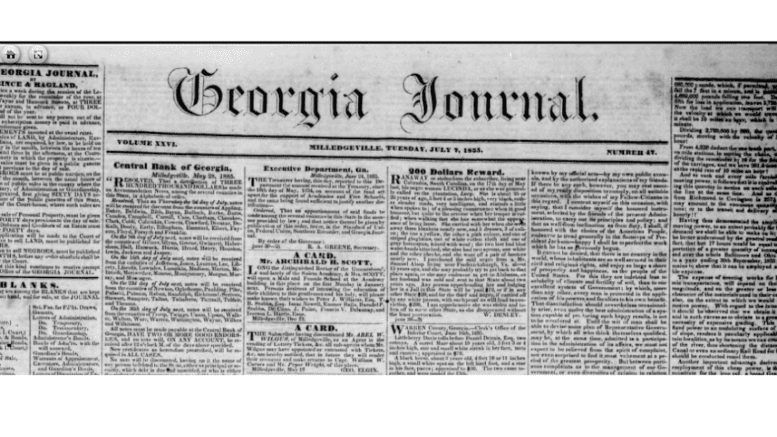In 1835 Marietta had only existed for a year, and Cobb County had only been created two years earlier. It was in many ways a frontier town as the new city organized itself, sold lots, and built a jail and other public buildings.
Not surprisingly, the new town faced what might have been its first moral panic during the sometimes chaotic building process: the scourge of gambling and gamblers.
The Georgia Journal, the newspaper for then-state capital Milledgeville, ran the following notice on page 14 of its July 7, 1835 edition (follow the link to read it as it originally appeared):
A meeting of the Citizens of Marietta , Cobb County on the 22nd day of June 1835, on motion of Josiah Massey, Esq, J.D Rice Esq was called to the Chair and Maj E.R. Mills appointed secretary. Then on motion of HR Foot, Esquire, the following preamble and resolutions were unanimously adopted.
Whereas the practice of gaming being and its general tendency pernicious to the morals and destructive of the peace and quiet of society, and of the happiness and often of the fortunes of those who are so unfortunate as to indulge in it.
And whereas, the justness of the above observation, having been fully illustrated by events, which have transpired in the town of Marietta, and these events having spread abroad, and greatly injured the character of our village for good order, sobriety and morality, and we the citizens thereof being desirous to redeem the character of the place, and put down the practice of gaming and with it, the vices attendant thereon, deem it expedient to form an Anti-Gaming Society.
And to this end, we adopt the following resolutions viz:
- Resolved that there shall be an instrument drawn up, which Shall pledge the honor of those who sign it to use every possible influence with their friends who had fallen into the habit of gaming, to induce them to abandon the habit. It is further contained, and shall further contain a pledge to prosecute all persons who game within or near the village after being admonished by their friends. To renounce the habit, and in all cases, where traveling vagabonds calling themselves gamblers Visit the game within or near the village of Mariana is to be considered the duty of the members to prosecute when the testimony will be sufficient to convict. It shall also contain the pledge of the signers not to engage in any kind of gaming.
- Resolved that those who signed the society instrument and violate any of the pledges the area contained, shall be considered unworthy the competence of the society and unworthy of the esteem, do a citizen of strict veracity.
- Resolved that it is not the object of this society to create invidious distinctions among the citizens of the village, or to single out those who game as a peculiar subjects against whom the resolutions are directed, but that on the contrary, it is the earnest desire of the agents and creating the society to unite the whole village in an effort to suppress a vice so fraught with evil.
- Resolved that the proceedings of this meeting to be published in the Georgia journal and Federal Union, and all other papers that are favorable to the objects of the meeting.
JD Ross Chairman
ER Mills Secretary
Instrument:
We the Citizens of Marietta hereby pledge our honor, to refrain from gambling ourselves and to use our influence with those of of our friends who are in the habit of gaming to induce them to abandon the habit.
We further promise not only to prosecute our friends, who remain refractory after being admonished, but all persons and particularly the gambling swindlers, who sometimes infest our town, whom we shall detect in the act of gambling, June 22 1835.
Like other moral panics and prohibitions over the next nearly 200 years of U.S. history, it’s doubtful that the Anti-Gaming Society made a real dent in the problem it was intended to address. But the effort certainly wins points for colorful language.

